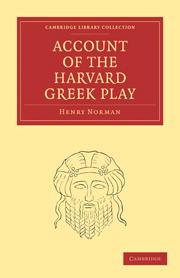Book contents
- Frontmatter
- Contents
- Illustractions
- PREFATORY NOTE BY PROFESSOR W. W. GOODWIN
- INTRODUCTION
- I THE ORIGIN OF THE PLAY
- II SOPHOCLES
- III “OEDIPUS THE KING”
- IV THE PREPARATION OF THE PLAY
- V THE PERFORMANCES
- VI IN RETROSPECT
- APPENDIX 1 THE CIRCULAR OF THE COMMITTEE
- APPENDIX 2 THE PROGRAMME
- APPENDIX 3 A BIBLIOGRAPHY OF THE PLAY
- Plate section
I - THE ORIGIN OF THE PLAY
Published online by Cambridge University Press: 05 April 2012
- Frontmatter
- Contents
- Illustractions
- PREFATORY NOTE BY PROFESSOR W. W. GOODWIN
- INTRODUCTION
- I THE ORIGIN OF THE PLAY
- II SOPHOCLES
- III “OEDIPUS THE KING”
- IV THE PREPARATION OF THE PLAY
- V THE PERFORMANCES
- VI IN RETROSPECT
- APPENDIX 1 THE CIRCULAR OF THE COMMITTEE
- APPENDIX 2 THE PROGRAMME
- APPENDIX 3 A BIBLIOGRAPHY OF THE PLAY
- Plate section
Summary
THE presentation of a Greek tragedy was no new idea at Harvard University. In 1876 the Memorial Hall was completed by the erection of the Sanders Theatre, and Professor Goodwin wished to mark the occasion by the performance of the Antigone of Sophocles in the original Greek. After a favorable reception and some discussion the plan was abandoned because of its many difficulties. The idea of a Harvard Greek play was then allowed to lie in abeyance, witli an occasional allusion by some enthusiastic person, until the summer of 1880. In the mean time the Agamemnon of Aeschylus had been performed with signal success by Oxford students, and had met with the wannest reception in London. Many accounts of the Oxford play and its success had come across the ocean and had aroused the dormant desire to produce a similar play at Harvard. Some of the English newspapers have alluded slightingly to the Harvard play as another instance of the “manner in which America follows everything that is initiated in England.” This is unjust, as the idea had been entertained here long before the Agamemnon was thought of at Oxford. On the other hand, the assertion in this country that the Oedipus at Harvard was an entirely spontaneous and independent movement, is equally untrue. We are indebted to England for the immediate inspiration and suggestion of the undertaking; had there been no Agamemnon at Oxford there would have been no Oedipus at Harvard.
The awakened plan took shape at the meetings of an informal philological club, which numbered among its members several Harvard professors. A Harvard Greek play, — why not?
- Type
- Chapter
- Information
- Account of the Harvard Greek Play , pp. 16 - 19Publisher: Cambridge University PressPrint publication year: 2010First published in: 1882



